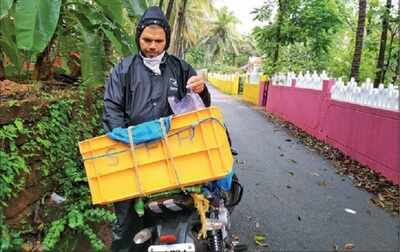
Succoro Fernandes is still surrounded by fish. Only now, the fish are dead and he’s not at sea. For five years, Fernandes worked as a storekeeper on a cruise liner. It was a good job that took the 36-year-old around the world and paid well. Then, the pandemic cast a shadow over the cruise industry. Outbreaks on ships, such as the Diamond Princess, spooked clients and governments. Fernandes has been beached ever since.
Now his day starts at 3am with tea. He then rides his bike to the wholesale fish market in Margao, 40 minutes away, buys fresh fish and starts his rounds of nearby villages to sell it. By 11am, he is done. Most days, he makes Rs 600-700 — enough to pay his bills, but nothing like his seafaring days.
“If I don’t do this, how will I feed my family?” says Fernandes. Across the state, 25,000 other out-of-work seafarers are also coming to terms with their new life. Some have started makeshift chicken stalls and takeaways in local markets, others are trying their luck at river fishing. If there’s a vacancy for a driver’s job, they are the first with their applications.
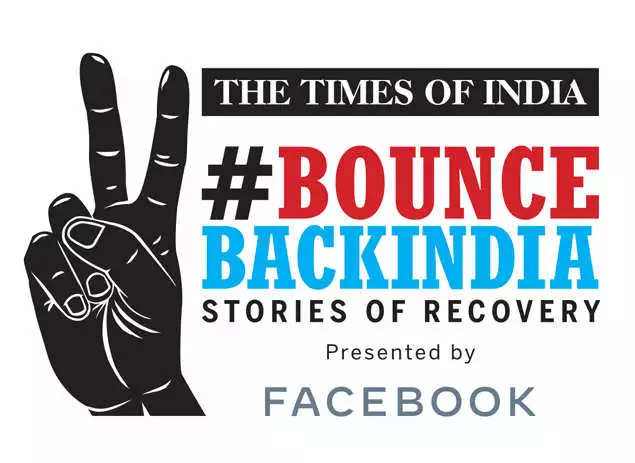
Fraizer Fernandes has used his experience as a bartender with P&O cruises to start a party and wedding planning business. And he is not alone. “Who knows the nitty-gritty of sanitisation better than a cruise ship worker?” he says.
“A lot of boys want to do something else. They have EMIs to pay and need money for their daily expenses,” says Frank Viegas, president of the Goa Seamen Association of India, adding that they are thinking of providing skill development and entrepreneurship training to members.
But it’s not just the sailors who have had to change course in this crisis. Drug peddlers, who sold to tourists, and the many punters involved in ‘matka’ gambling — a low-stakes lottery with a daily turnover of Rs 10-12 crore — have all ‘reformed’ for now. From selling face masks to washing cars, they are game for any odd job. Some bookies are selling fruit, vegetables and eggs in their old haunts to make ends meet.
“During the lockdown, there was neither money nor drugs. Those who earned through hard work lost their jobs when tourism stopped. It was a difficult time for everyone,” says Dr Ravindra Patil, medical officer at Mapusa district hospital’s Drug Treatment Centre (DTC).
The good times are yet to return but at least one matka punter is pleased with his new ‘clean’ work. “The cops have not harassed me ever since I turned over a new leaf,” he says.
This story is part of a series in association with Facebook. Facebook has no editorial role in this story.
Now his day starts at 3am with tea. He then rides his bike to the wholesale fish market in Margao, 40 minutes away, buys fresh fish and starts his rounds of nearby villages to sell it. By 11am, he is done. Most days, he makes Rs 600-700 — enough to pay his bills, but nothing like his seafaring days.
“If I don’t do this, how will I feed my family?” says Fernandes. Across the state, 25,000 other out-of-work seafarers are also coming to terms with their new life. Some have started makeshift chicken stalls and takeaways in local markets, others are trying their luck at river fishing. If there’s a vacancy for a driver’s job, they are the first with their applications.

Fraizer Fernandes has used his experience as a bartender with P&O cruises to start a party and wedding planning business. And he is not alone. “Who knows the nitty-gritty of sanitisation better than a cruise ship worker?” he says.
“A lot of boys want to do something else. They have EMIs to pay and need money for their daily expenses,” says Frank Viegas, president of the Goa Seamen Association of India, adding that they are thinking of providing skill development and entrepreneurship training to members.
But it’s not just the sailors who have had to change course in this crisis. Drug peddlers, who sold to tourists, and the many punters involved in ‘matka’ gambling — a low-stakes lottery with a daily turnover of Rs 10-12 crore — have all ‘reformed’ for now. From selling face masks to washing cars, they are game for any odd job. Some bookies are selling fruit, vegetables and eggs in their old haunts to make ends meet.
“During the lockdown, there was neither money nor drugs. Those who earned through hard work lost their jobs when tourism stopped. It was a difficult time for everyone,” says Dr Ravindra Patil, medical officer at Mapusa district hospital’s Drug Treatment Centre (DTC).
The good times are yet to return but at least one matka punter is pleased with his new ‘clean’ work. “The cops have not harassed me ever since I turned over a new leaf,” he says.
This story is part of a series in association with Facebook. Facebook has no editorial role in this story.
Download
The Times of India News App for Latest India News

Coronavirus outbreak
Trending Topics
LATEST VIDEOS
India
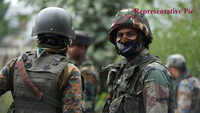 Search operation launched to trace Territorial Army jawan missing since Sunday
Search operation launched to trace Territorial Army jawan missing since Sunday  S Korea thinking to establish Korean language institute in Delhi, says Envoy
S Korea thinking to establish Korean language institute in Delhi, says Envoy 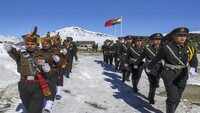 India strengthens troop presence in northern Ladakh to tackle Chinese threat
India strengthens troop presence in northern Ladakh to tackle Chinese threat 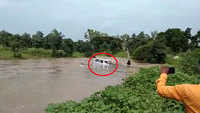 On cam: Car with three occupants washed away while crossing rivulet
On cam: Car with three occupants washed away while crossing rivulet  ‘Sawan’: Devotees offer prayers at Shiva Temples across India
‘Sawan’: Devotees offer prayers at Shiva Temples across India 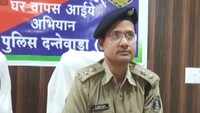 Naxal carrying reward of Rs 8 lakh surrendered in Chhattisgarh’s Dantewada on sister’s appeal
Naxal carrying reward of Rs 8 lakh surrendered in Chhattisgarh’s Dantewada on sister’s appeal
More from TOI
Navbharat Times
Featured Today in Travel
Quick Links
Coronavirus in MumbaiCoronavirus in KolkataCoronavirus in HyderabadCoronavirus in DelhiCoronavirus in BangaloreCoronavirus symptomsCoronavirus in IndiaWhat is CoronavirusCoronavirus NewsSolar EclipseNPRWhat is NRCCAB BillCAB and NRCRTI BillPodcast newsLok SabhaShiv SenaYSRCPCongressBJP newsUIDAIIndian ArmyISRO newsSupreme Court
Get the app



